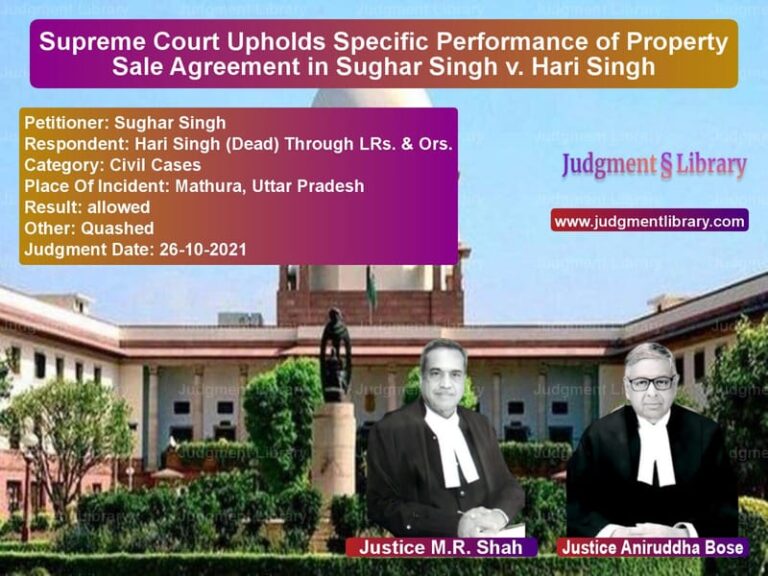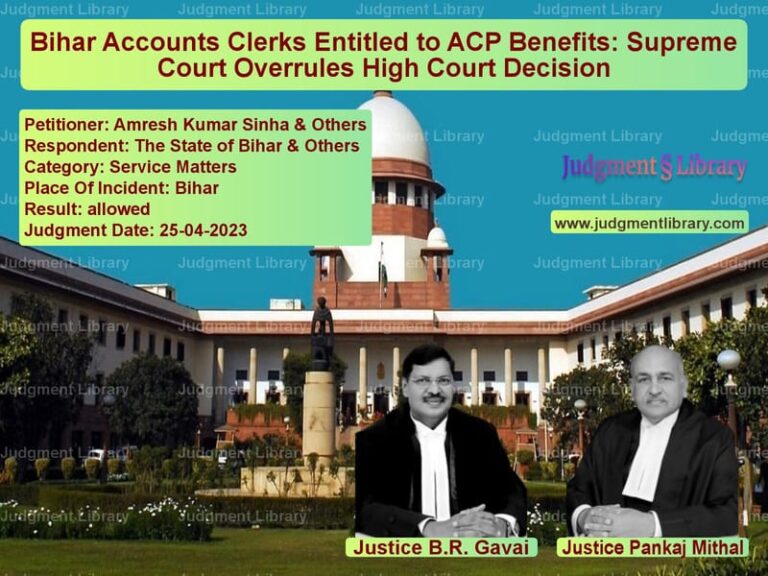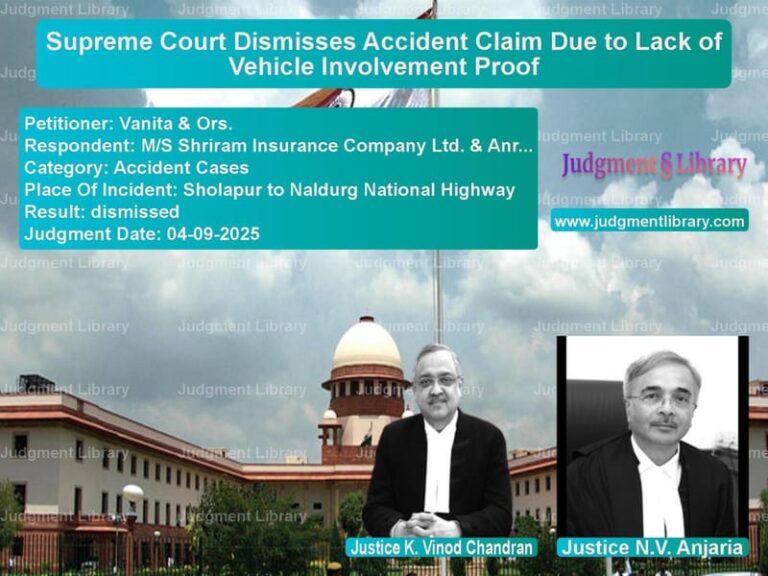Supreme Court Enhances Compensation in Worksite Injury Case
The case of Chandramma vs. Manager, Regional Office, NCC Limited & Anr. pertains to a worksite accident that left the appellant permanently disabled. The dispute revolved around the adequacy of compensation awarded under the Employees Compensation Act, 1923, with the appellant seeking a higher amount due to her total incapacitation. The Supreme Court examined the nature of the injury, the correct assessment of disability, and the applicable legal principles to determine a fair compensation.
Background of the Case
The appellant, Chandramma, was employed as a laborer in the construction of a government hospital in Bidar, Karnataka. On July 22, 2015, while shifting cement from the ground floor to the second floor, a centering plate collapsed on her, causing her to fall from the second floor to the ground. The accident resulted in multiple fractures, including a spinal bone fracture and compound fractures on other body parts. Medical evaluations concluded that she would be unable to lift any weight for the rest of her life, rendering her incapable of continuing her profession.
Following the accident, the appellant filed a compensation claim under Section 10 of the Employees Compensation Act, 1923, seeking Rs. 20 lakhs along with 18% interest per annum from the date of the accident. However, the Commissioner for Employees Compensation awarded her only Rs. 1,75,000, stating that she had not proven her claim that she was earning Rs. 600 per day.
Arguments by the Appellant
Represented by Advocate Shankar Divate, the appellant challenged the award on the following grounds:
- The compensation awarded was inadequate given her total incapacitation.
- The medical evidence clearly established that she had suffered 100% professional disability and could not work in any other profession.
- The lower courts had incorrectly assessed her monthly income, underestimating her earnings despite the established facts.
- Compensation under the Workmen Compensation Act should be based on actual earning capacity, not just theoretical minimum wages.
Arguments by the Respondents
The respondents, represented by Advocate Parijat Kishore, argued:
- The compensation awarded by the High Court was fair and did not require further enhancement.
- The appellant failed to produce sufficient evidence to prove her daily wages were Rs. 600.
- The disability percentage should be taken as 20% as per the findings of the lower courts.
Supreme Court’s Observations
After reviewing the facts, the Supreme Court made the following key observations:
- The appellant had suffered from permanent total disability and could no longer work as a laborer.
- Under the Employees Compensation Act, 1923, compensation should reflect the real loss of earning capacity.
- The medical records and doctors’ testimony confirmed that the appellant was incapable of performing any manual labor.
- The Commissioner’s decision to assess her disability at 20% was erroneous, as she was unable to perform any work requiring physical effort.
- The appropriate multiplier under Section 4 of the Employees Compensation Act for a 40-year-old should be 184.17.
Supreme Court’s Verdict
Based on its findings, the Supreme Court enhanced the compensation as follows:
| Head | Amount (Rs.) |
|---|---|
| Loss of earning capacity (Total disability) | 8,84,016 |
| Medical expenses | 42,200 |
| Total Compensation | 9,30,000 |
The Court also directed that the insurance company pay 9% interest per annum from the date of filing the claim until full realization.
Legal Precedents Considered
The Supreme Court referred to several key judgments in determining the compensation:
- Raj Kumar vs. Ajay Kumar (2011) 1 SCC 343: Established principles for assessing loss of future earnings in disability cases.
- K. Janardhan vs. United India Insurance Co. Ltd. (2008) 8 SCC 518: Clarified that if a worker can no longer perform their job, the functional disability should be considered 100%.
- S. Suresh vs. Oriental Insurance Co. Ltd. (2010) 13 SCC 777: Held that loss of a limb rendering a person unfit for their previous job constitutes total disability.
Conclusion
The Supreme Court’s judgment underscores the principle that compensation in worksite injury cases should reflect the real earning capacity lost due to the accident. By rectifying the lower courts’ miscalculation and acknowledging the true impact of the injury, the ruling ensures justice for injured workers under the Employees Compensation Act, 1923. The case sets a crucial precedent for similar claims, reinforcing that the assessment of disability should align with its practical effect on livelihood.
Petitioner Name: Chandramma.Respondent Name: Manager, Regional Office, NCC Limited & Anr..Judgment By: Justice Krishna Murari, Justice S. Ravindra Bhat.Place Of Incident: Bidar, Karnataka.Judgment Date: 09-12-2022.
Don’t miss out on the full details! Download the complete judgment in PDF format below and gain valuable insights instantly!
Download Judgment: chandramma-vs-manager,-regional-of-supreme-court-of-india-judgment-dated-09-12-2022.pdf
Directly Download Judgment: Directly download this Judgment
See all petitions in Employment Disputes
See all petitions in Workplace Harassment
See all petitions in Compensation Disputes
See all petitions in Judgment by Krishna Murari
See all petitions in Judgment by S Ravindra Bhat
See all petitions in allowed
See all petitions in Modified
See all petitions in supreme court of India judgments December 2022
See all petitions in 2022 judgments
See all posts in Service Matters Category
See all allowed petitions in Service Matters Category
See all Dismissed petitions in Service Matters Category
See all partially allowed petitions in Service Matters Category







